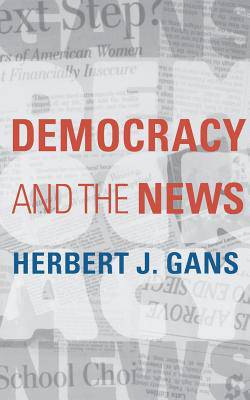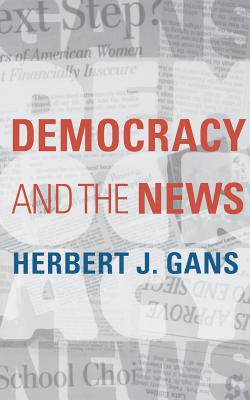
Je cadeautjes zeker op tijd in huis hebben voor de feestdagen? Kom langs in onze winkels en vind het perfecte geschenk!
- Afhalen na 1 uur in een winkel met voorraad
- Gratis thuislevering in België vanaf € 30
- Ruim aanbod met 7 miljoen producten
Je cadeautjes zeker op tijd in huis hebben voor de feestdagen? Kom langs in onze winkels en vind het perfecte geschenk!
- Afhalen na 1 uur in een winkel met voorraad
- Gratis thuislevering in België vanaf € 30
- Ruim aanbod met 7 miljoen producten
Zoeken
Omschrijving
American democracy was founded on the belief that ultimate power rests in an informed citizenry. But that belief appears naive in an era when private corporations manipulate public policy and the individual citizen is dwarfed by agencies, special interest groups, and other organizations that have a firm grasp on real political and economic power.
In Democracy and the News, one of America's most astute social critics explores the crucial link between a weakened news media and weakened democracy. Building on his 1979 classic media critique Deciding What's News, Herbert Gans shows how, with the advent of cable news networks, the internet, and a proliferation of other sources, the role of contemporary journalists has shrunk, as the audience for news moves away from major print and electronic media to smaller and smaller outlets. Gans argues that journalism also suffers from assembly-line modes of production, with the major product being publicity for the president and other top political officials, the very people citizens most distrust. In such an environment, investigative journalism--which could offer citizens the information they need to make intelligent critical choices on a range of difficult issues--cannot flourish. But Gans offers incisive suggestions about what the news media can do to recapture its role in American society and what political and economic changes might move us closer to a true citizen's democracy.
Touching on questions of critical national importance, Democracy and the News sheds new light on the vital importance of a healthy news media for a healthy democracy.
In Democracy and the News, one of America's most astute social critics explores the crucial link between a weakened news media and weakened democracy. Building on his 1979 classic media critique Deciding What's News, Herbert Gans shows how, with the advent of cable news networks, the internet, and a proliferation of other sources, the role of contemporary journalists has shrunk, as the audience for news moves away from major print and electronic media to smaller and smaller outlets. Gans argues that journalism also suffers from assembly-line modes of production, with the major product being publicity for the president and other top political officials, the very people citizens most distrust. In such an environment, investigative journalism--which could offer citizens the information they need to make intelligent critical choices on a range of difficult issues--cannot flourish. But Gans offers incisive suggestions about what the news media can do to recapture its role in American society and what political and economic changes might move us closer to a true citizen's democracy.
Touching on questions of critical national importance, Democracy and the News sheds new light on the vital importance of a healthy news media for a healthy democracy.
Specificaties
Betrokkenen
- Auteur(s):
- Uitgeverij:
Inhoud
- Aantal bladzijden:
- 168
- Taal:
- Engels
Eigenschappen
- Productcode (EAN):
- 9780195173277
- Verschijningsdatum:
- 6/05/2004
- Uitvoering:
- Paperback
- Formaat:
- Trade paperback (VS)
- Afmetingen:
- 128 mm x 204 mm
- Gewicht:
- 204 g

Alleen bij Standaard Boekhandel
+ 25 punten op je klantenkaart van Standaard Boekhandel
Beoordelingen
We publiceren alleen reviews die voldoen aan de voorwaarden voor reviews. Bekijk onze voorwaarden voor reviews.









